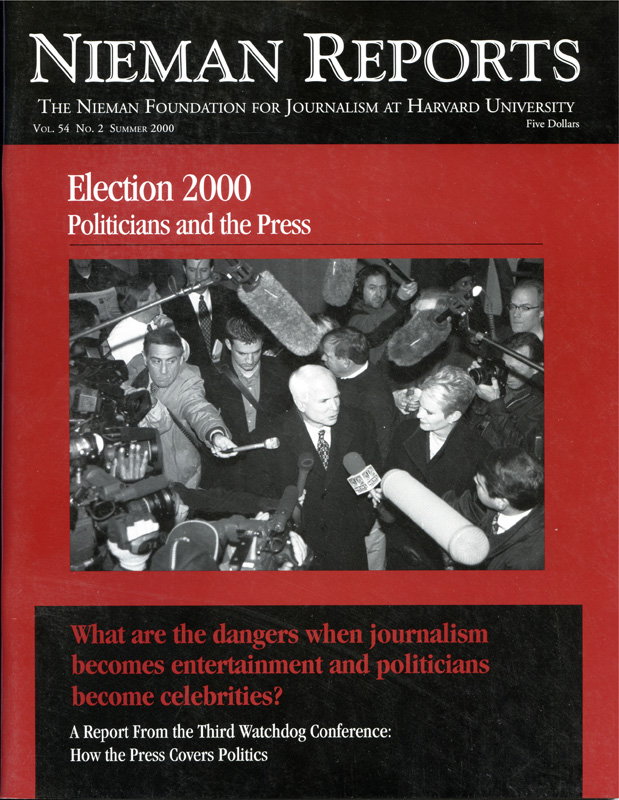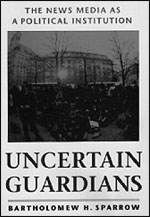Bartholomew Sparrow has put the American news media under a microscope and come to a simple conclusion. Things are not only not okay, they are downright lousy.
In “Uncertain Guardians: The News Media as a Political Institution,” Sparrow contends the media are no longer guardians of the public interest. Once proud and independent watchdogs, reporters, editors and producers have been reduced to little more than lap dogs for larcenous, Wall Street-driven corporations and manipulative government officials from Ronald Reagan to Bill Clinton whose handlers have become practiced spinners of the truth.
The press is rarely adversarial these days, Sparrow argues, and usually rears its collective head only when the prominent elites on which it feeds are in conflict with each other.
“For all the preeminence of the watchdog or guardian role of the news media, I argue that the ‘fourth estate’ model of the news media is fundamentally wrong,” he writes. “Only rarely and to a limited extent are the news media able to act as significant checks on national government or as advocates of a broader public interest.”
Sparrow admits early on that his is an interpretive project since there are no databases on editors’ decisions about what to publish, or on the credibility of politicians, or about how political and economic considerations impact what ends up in print or on the air. An associate professor of government at the University of Texas, Sparrow manages a scholarly tone through his argument with more than 60 pages of sourcing notes.
Perhaps his most damning conclusions come in the chapter appropriately titled “Making Money and Making News.” Here Sparrow details how the news business has become just another business driven by publicly owned companies’ desire to maximize profits at the expense of in-depth and controversial reporting. In one two-page section, he provides a long list of media companies that inhabit the Fortune 500 and segues into recent takeovers where already huge corporations gobble up their smaller competitors in the pursuit of even greater profits. He makes the point that these mega-mergers will continue, a conclusion underscored by the fact that Time Warner, which he points out merged with Turner Broadcasting, has since the book’s publication announced a mega-merger with America Online.
Sparrow points out that newspaper giants like Gannett have been able to take over smaller newspaper companies and squeeze profits of up to 40 percent through a variety of draconian measures, which have left their media properties increasingly devoid of substance. This has been good for the accountants who run the corporations, good for the stockholders whose portfolios have soared, but a disaster for a profession whose true believers were always dependent on some degree of benevolence from those controlling the purse strings.
The bottom line in American journalism at the dawning of the new millennium is increasingly the bottom line, Sparrow concludes.
Even journalists, once the champions of the underdog, have gotten in on the greed game. Sparrow recalled this anecdote by a Washington bureau chief for NBC: “When the stock market crashed in 1929, the newspaper reporters at The Boston Globe cheered; when the market crashed in 1987, they ran and called their stockbrokers.”
Sparrow recounts a number of recent reporter sins including the general (at least initial) acceptance of the Reagan Administration’s lies about the Soviet downing of Korean airliner KAL 007, the boosterish coverage of the Gulf War in which scores of Iraqi citizens were killed by so-called “smart bombs,” and the absence of oversight when billions of dollars were lifted from taxpayers’ pockets by special interest groups as part of the savings and loan bailout.
Despite the dismal view of the state of the craft, Sparrow is not without hope or suggestions about how to fix the mess in which he envisions the press. He proposes the government tax advertising revenues while subsidizing the media based on their ability to attract circulation—a noble idea, but one that powerful corporations with forceful lobbying arms would certainly squash. A breakup of media ownership concentrations is also a good idea, Sparrow asserts, but he is well aware that things are moving fast in the other direction, accelerated by the 1996 Telecommunications Act.
On more practical ground, Sparrow proposes that the media take a tougher and more skeptical stance when dealing with government policy pronouncements, provide more detailed coverage of political and economic news, and pursue civic journalism by engaging the local community.
“Things are not OK,” Sparrow wrote in a response to a critique of his book. “But the situation that Congress, the media, and the public have created, the Congress, the media, and the public can work to reform.”
Jim Tharpe is Deputy Metro Editor of The Atlanta Journal-Constitution. He has worked at newspapers in Florida, South Carolina, and Alabama. He is a 1989 Nieman Fellow.
In “Uncertain Guardians: The News Media as a Political Institution,” Sparrow contends the media are no longer guardians of the public interest. Once proud and independent watchdogs, reporters, editors and producers have been reduced to little more than lap dogs for larcenous, Wall Street-driven corporations and manipulative government officials from Ronald Reagan to Bill Clinton whose handlers have become practiced spinners of the truth.
The press is rarely adversarial these days, Sparrow argues, and usually rears its collective head only when the prominent elites on which it feeds are in conflict with each other.
“For all the preeminence of the watchdog or guardian role of the news media, I argue that the ‘fourth estate’ model of the news media is fundamentally wrong,” he writes. “Only rarely and to a limited extent are the news media able to act as significant checks on national government or as advocates of a broader public interest.”
Sparrow admits early on that his is an interpretive project since there are no databases on editors’ decisions about what to publish, or on the credibility of politicians, or about how political and economic considerations impact what ends up in print or on the air. An associate professor of government at the University of Texas, Sparrow manages a scholarly tone through his argument with more than 60 pages of sourcing notes.
Perhaps his most damning conclusions come in the chapter appropriately titled “Making Money and Making News.” Here Sparrow details how the news business has become just another business driven by publicly owned companies’ desire to maximize profits at the expense of in-depth and controversial reporting. In one two-page section, he provides a long list of media companies that inhabit the Fortune 500 and segues into recent takeovers where already huge corporations gobble up their smaller competitors in the pursuit of even greater profits. He makes the point that these mega-mergers will continue, a conclusion underscored by the fact that Time Warner, which he points out merged with Turner Broadcasting, has since the book’s publication announced a mega-merger with America Online.
Sparrow points out that newspaper giants like Gannett have been able to take over smaller newspaper companies and squeeze profits of up to 40 percent through a variety of draconian measures, which have left their media properties increasingly devoid of substance. This has been good for the accountants who run the corporations, good for the stockholders whose portfolios have soared, but a disaster for a profession whose true believers were always dependent on some degree of benevolence from those controlling the purse strings.
The bottom line in American journalism at the dawning of the new millennium is increasingly the bottom line, Sparrow concludes.
Even journalists, once the champions of the underdog, have gotten in on the greed game. Sparrow recalled this anecdote by a Washington bureau chief for NBC: “When the stock market crashed in 1929, the newspaper reporters at The Boston Globe cheered; when the market crashed in 1987, they ran and called their stockbrokers.”
Sparrow recounts a number of recent reporter sins including the general (at least initial) acceptance of the Reagan Administration’s lies about the Soviet downing of Korean airliner KAL 007, the boosterish coverage of the Gulf War in which scores of Iraqi citizens were killed by so-called “smart bombs,” and the absence of oversight when billions of dollars were lifted from taxpayers’ pockets by special interest groups as part of the savings and loan bailout.
Despite the dismal view of the state of the craft, Sparrow is not without hope or suggestions about how to fix the mess in which he envisions the press. He proposes the government tax advertising revenues while subsidizing the media based on their ability to attract circulation—a noble idea, but one that powerful corporations with forceful lobbying arms would certainly squash. A breakup of media ownership concentrations is also a good idea, Sparrow asserts, but he is well aware that things are moving fast in the other direction, accelerated by the 1996 Telecommunications Act.
On more practical ground, Sparrow proposes that the media take a tougher and more skeptical stance when dealing with government policy pronouncements, provide more detailed coverage of political and economic news, and pursue civic journalism by engaging the local community.
“Things are not OK,” Sparrow wrote in a response to a critique of his book. “But the situation that Congress, the media, and the public have created, the Congress, the media, and the public can work to reform.”
Jim Tharpe is Deputy Metro Editor of The Atlanta Journal-Constitution. He has worked at newspapers in Florida, South Carolina, and Alabama. He is a 1989 Nieman Fellow.




